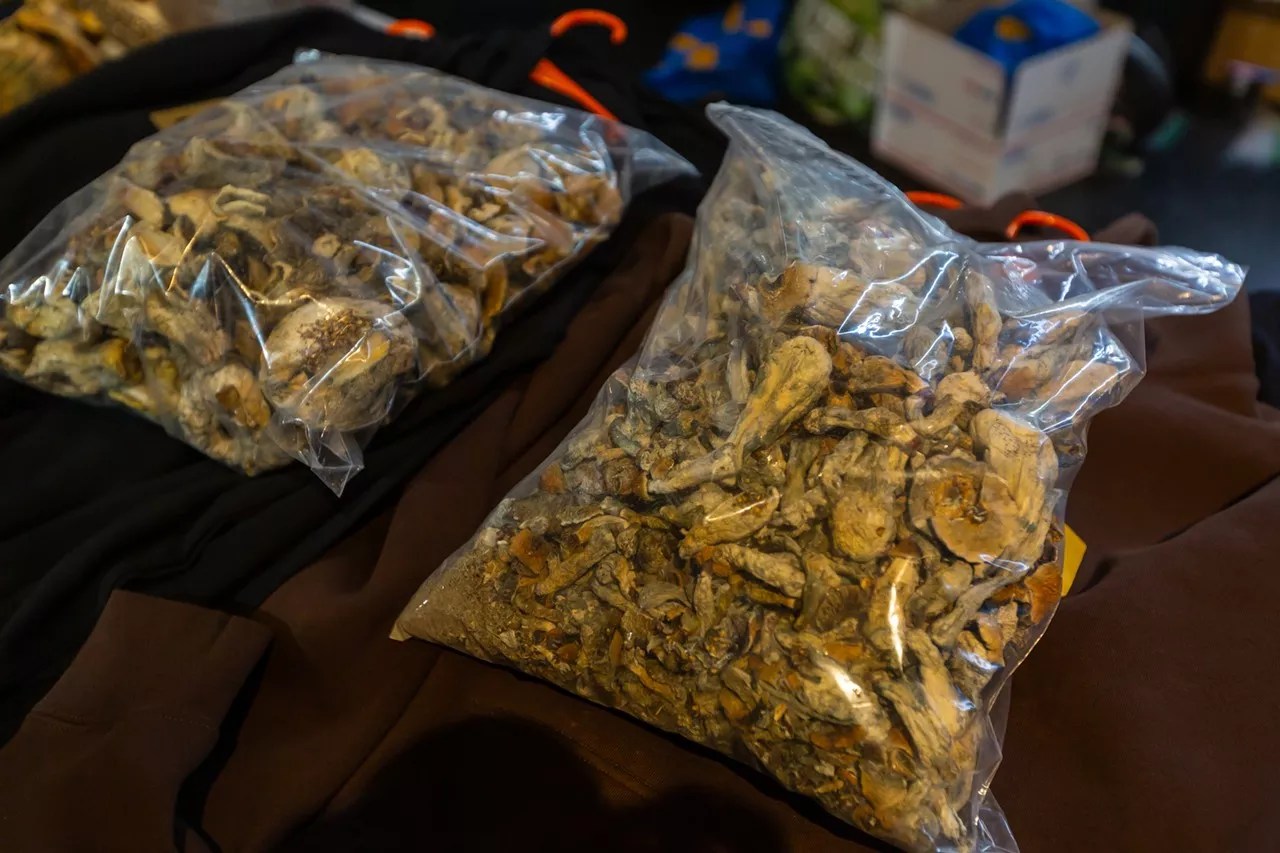
Brandon Johnson

Audio By Carbonatix
The state’s Natural Medicine Division (NMD) held a forum last week for Coloradans eager to enter the world of natural medicine. With over a hundred participants on Zoom and a roomful at the Red Rocks Community Center, the NMD fielded questions about the affordability and timing of the application and licensing processes, which will begin no later than December 31.
The NMD was established by the Colorado Department of Revenue in 2023 to come up with the rules regarding psilocybin products, facilities and businesses made legal by the passage of Proposition 122 in November 2022.
The NMD has proposed three types of applications: for a natural medicine owner, a natural medicine business or a natural medicine handler.
According to Kasey Speyer, director of licensing for the NMD, while the applications for owner and handler are similar, the owner’s is reserved for individuals who are interested in owning a business that sells natural medicine, while the handler application is for employees, including facilitators, who will handle regulated natural medicine. The business application is for individuals who are want to own and operate a healing center, cultivation facility, testing facility or product-manufacturing facility, with the same application required for all business categories.
Owner and handler applications both include questions about past licenses, criminal history and financial interests, but the handler application is shorter and omits tax and financial disclosure requirements. Allison Robinette, the NMD’s director of Policy & Regulatory Affairs, noted that support staff, such as custodians or front-desk workers at natural medicine facilities, don’t have to be licensed by the department because they’re not handling natural medicine.
The business application asks individuals to provide their business name and type (with a different application for each type), the ownership structure of the business, a list of people who have financial interests in the license, and facility diagrams. If the facility is shown to be less than 1,000 feet from a school or child-care facility, or if it does not comply with local zoning codes, the license cannot be registered. Applicants must also agree to a tax compliance verification.
All three application categories include disqualifying criteria, such as the applicant being under 21, having recent felony convictions or being in non-compliance with child-support obligations.
Once someone submits an application, they have to pay the associated application fee, according to Speier. A licensing specialist will then review the application to determine whether it’s complete and accurate; once it’s approved for processing, it will enter the queue for license assignment.
During the review, applicants may need to submit additional materials. Approved applications will receive license recommendations, and applicants must pay compliance fees to receive their license certificates.
In response to a number of questions about how long the application and licensing process might take, Speyer said that the NMD can’t yet predict the time frame because of how new the program is. The schedule will depend on a number of factors, she added, including how many applications the office receives, when it receives them and whether the applications are complete or not.
The NMD won’t be conducting any pre-operation inspections of licensed businesses or facilities, although local jurisdictions can conduct their own pre-operation safety inspections, which could include fire department and building inspections to ensure compliance with state law and local ordinances.
According to Kyle Lambert, NMD’s senior deputy director, inspections will be conducted once a business becomes operational, but the timing will depend on the volume of operating licenses and certain risk factors, such as product safety and preventing youth access.
“We will focus on using intervention strategies that encourage comprehensive and long-term compliance,” said Lambert, defining intervention strategies as providing more resources and educational opportunities to licensees so that they can return to compliance. When necessary, he added, the NMD will use enforcement-based strategies for licensees who are not compliant, which could include warning letters, assurances of voluntary compliance and, in some cases, the suspension or revocation of the license.
“The way I’m hearing all this, I’m anticipating what I guess I would describe as a logistical logjam,” said Ryan Phillips, a naturopathic doctor at NeuroGrove Integrative Health. If experienced individuals such as himself and many others in the room couldn’t get facilitator licenses straight out of the gate, he asked, who would be qualified to get them? And how would healing centers function without them?
“People like us that aren’t big corporations who are making an extreme investment on this and having to wait so long to get a return on your investment – it’s gonna bankrupt us,” he said, earning a round of applause from the crowd.
Addressing what Phillips termed a “Catch-22,” Lambert said that the NMD will have to collaborate with the Department of Regulatory Agencies, which oversees the overall licensing and application process for natural medicine facilitators, to fine-tune the process with facilitator applications and licensing and healing center applications and licensing.
According to Robinette, there’s a statutory requirement that a healing center license be associated with the facilitator, and state regulators will have to think “creatively outside of the box” to avoid the situation that Phillips described.
Sean McAllister, an attorney in the psychedelic industry who helped write Proposition 122, posed a series of questions regarding the application processes for training facilitators who want to work in a healing center rather than at home. Robinette said they’d take those questions back to DORA.
“Can we ever have a thing when DORA’s here, too, please?” asked one audience member. “Because this feels like it’s always back and forth in each of the meetings, and it’s really not helpful.”
Robinette thanked her for her feedback and said they will work on including members of DORA at future forums.
Starting December 31, the applications will be available online through a platform called “MyLicense Office” used by the Department of Revenue, as well as in person at the NMD’s Lakewood office, with one appointment per week to start.